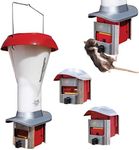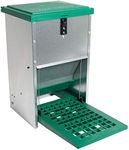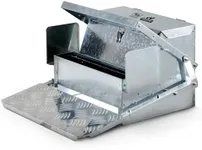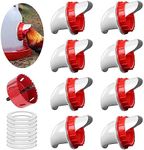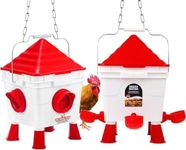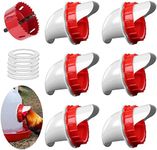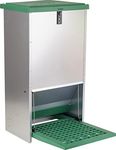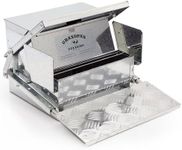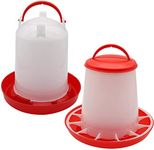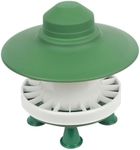Buying Guide for the Best Chicken Feeders
Choosing the right chicken feeder is essential for maintaining the health and well-being of your flock. A good feeder will minimize waste, prevent contamination, and ensure that your chickens have access to food at all times. When selecting a chicken feeder, consider the size of your flock, the type of feed you use, and the environment in which your chickens live. Here are some key specifications to consider when choosing a chicken feeder.CapacityCapacity refers to the amount of feed a feeder can hold. This is important because it determines how often you need to refill the feeder. For small flocks, a feeder with a capacity of 5-10 pounds may be sufficient. For larger flocks, you might need a feeder that holds 20 pounds or more. Consider your flock size and how often you want to refill the feeder when choosing the right capacity.
MaterialChicken feeders can be made from various materials, including plastic, metal, and wood. Plastic feeders are lightweight and easy to clean, but they may not be as durable as metal feeders. Metal feeders are more robust and can withstand harsh weather conditions, making them ideal for outdoor use. Wooden feeders can be aesthetically pleasing but may require more maintenance. Choose a material that suits your environment and maintenance preferences.
DesignThe design of a chicken feeder can affect how easily chickens can access the feed and how much waste is produced. Trough feeders allow multiple chickens to eat at once but can lead to more waste. Gravity feeders dispense feed as chickens eat, reducing waste and ensuring a constant supply of food. Hanging feeders can be adjusted to the height of your chickens, preventing contamination from droppings. Consider the feeding habits of your chickens and the level of waste you are willing to manage when selecting a design.
Weather ResistanceWeather resistance is crucial if your feeder will be used outdoors. A weather-resistant feeder will protect the feed from rain, snow, and other elements, ensuring that it remains dry and fresh. Look for feeders with lids or covers that can keep out moisture and pests. If you live in an area with extreme weather conditions, choose a feeder made from durable materials that can withstand the elements.
Ease of CleaningKeeping your chicken feeder clean is important for preventing the spread of disease and ensuring the health of your flock. Some feeders are designed to be easily disassembled and cleaned, while others may have more complex structures that are harder to clean. Consider how often you are willing to clean the feeder and choose one that matches your maintenance preferences. Easy-to-clean feeders will save you time and effort in the long run.
